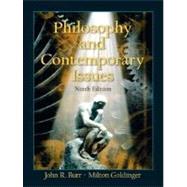
Note: Supplemental materials are not guaranteed with Rental or Used book purchases.
Purchase Benefits
What is included with this book?
One of the most successful texts in its field over the last 30 years, Philosophy and Contemporary Issues introduces today's students to philosophy with timely, approachable readings of philosophical significance. The authors strive to demonstrate how philosophy illuminates and helps solve some of the important problems facing contemporary man, and they encourage students to engage in philosophizing themselves. This book successfully makes the subject interesting and intelligible for students encountering philosophy for the first time.
Features of the Ninth Edition: (NOTE: Each part begins with an Introduction and concludes with Suggestions for Further Reading.)
GENERAL INTRODUCTION.
I. FREEDOM AND DETERMINISM.
II. GOD AND RELIGION.
III. MORALITY AND SOCIETY.
IV. STATE AND SOCIETY.
V. MIND AND BODY.
VI. KNOWLEDGE AND SCIENCE.
The New copy of this book will include any supplemental materials advertised. Please check the title of the book to determine if it should include any access cards, study guides, lab manuals, CDs, etc.
The Used, Rental and eBook copies of this book are not guaranteed to include any supplemental materials. Typically, only the book itself is included. This is true even if the title states it includes any access cards, study guides, lab manuals, CDs, etc.